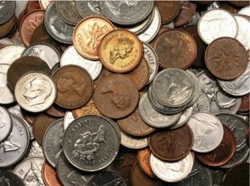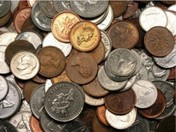So now that you have your budget prepared, how do you make sure you keep your budget? Discipline helps, but what helps more is envelope budgeting. Many truly wealthy people (not just those pretending to be wealthy) only carry as much cash as they need to make the purchases they want. Most of the rest of us forget how much we've spent/owe and end up buying things with money we didn't realize we had already spent or need to spend. Envelopes or "money jars" or whatever tool you use can really help. The following video explains how.
We saw a couple of posts ago a video by Dave Ramsey on the
7 Baby Steps to becoming financially independent. I've been talking with a lot of people about saving $1000 recently and most of them tell me the same thing: I don't have any money. Now, considering I know they work full-time I know that's not true, especially since I'm only talking to them about saving $25/mo (I've been saving $25/mo or more since I was 17 and the minimum wage was only $5.90/hr). The truth is, they don't know
where to find the $25/mo because they aren't monitoring their spending. In the following video financial planner, Lamont Stewart, explains the basics about how to make a budget. Bonus points if you can find the math error.
I'll finish off the post with one quick and easy tip I heard somewhere for setting up a budget: Live and spend normally for a month, but save every receipt in a shoe box. At the end of the month divide all of the expenditures into the various categories Lamont wrote on the white board. These should be your starting amounts for your budget. Now you can adjust accordingly to make a balanced budget (i.e., "positive cash flow").
I think many of us feel that if we could just make it big or get a lucky break we would be able to solve all of our problems. That's not always true though. We've all read about or heard about the family that won the lottery and then went bankrupt a few years later. The above video usually brings about a "holier than thou" response from viewers who think they would be much smarter than these "dumb athletes" but how sure are you about that? Can you honestly say you've never made a purchasing decision because of how you thought someone else might think of you? I know I can't. As Dave Ramsey would say, winning the money game is "more behavioural than mathematical."
The more I listen to Dave Ramsey the more I like his common sense, behaviour modification approach to winning at the money game. In the following video we see Dave's 7 Step approach to becoming debt free and financially independent - two things that are essential to Finding North in your finances.
Before I started helping people "find north" in their financial lives and get on the path to financial indpendence, I was a school teacher. One day a student came up to me and asked me if I had ever heard of the proverb, "a penny saved is a penny earned." Of course I had, but I had always just assumed that the proverb meant that saving a penny is the same as making a penny. The student told me his take on the saying, which amounted to, if you save a penny and invest it, eventually it will earn interest or some return and you will someday have two pennies. I thought that was a brilliant understanding and it got me thinking about all of the pennies we carelessly let fall on the ground or down our seat cushions. Watching the Gail Vaz-Oxlade interview yesterday reminded me about the importance of practicing the skill of saving. Watch the short video and then read further for an exciting special anouncement.
Okay, so the challenge is on! Get yourself a makeshift piggy bank (or an actual piggy bank) and let's start saving up some money. I have been doing this for the past few months, and I've noticed that the saving habit is like a muscle - the more you exercise it the stronger it becomes. I am posting a collective challenge to the Finding North readers out there, to save $1,000,000! I will be adding tips from time to time, as I come up with them or readers send them to me, and I will also be adding "A Penny Saved... Challenge" page to the website to keep everyone up to date on our progress.
I really like Gail Vaz-Oxlade. Her "Money Jars" from Til Debt Do Us Part is very clever. Here she discusses some more common-sense financial tips. Her point about starting the habit of saving is a great idea. I started putting all of the loose change from small purchases in a piggy bank and within about four months had over $16 saved up. That doesn't make me rich of course, but it did create a habit of saving that got me to start looking for other ways to save money as well. It led me to set up an automatic transfer of about $12 a week from my chequing account into a savings account, which I barely noticed but added up very quickly.
What is a TFSA? How does it work? How is it different from a RRSP? These are all qustions I get on a regular basis, and that should be answered pretty well by this post. The first video is a little hard to see visually, but if you listen to the explanation and follow along with the pen motions you should be able to get the essential information. The second video is for those who need a visual representation/analogy and who also like humour in their finance videos.


 RSS Feed
RSS Feed